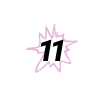This essay describes instances of sexual assault.

feature image by sarah

When you grow up in the 1950s, there are only two possible genders and your mother is one and your father is the other. You slide between them. You’re the kid who balks at dressing up for church, who hates ribbons, frills, white ankle socks, the seams inside dresses, and lace most of all; you are the kid who refuses shirts in the summer because boys do. You’re the kid who announces at two that you’re a boy, to horrified response. You keep trying this announcement every couple of years, while your mother explains how wrong you are. Boys — your brother — have a thingy dangling between their legs and you have nothing. You look in the mirror, standing on the toilet seat, to see your nothing, and you pull up the skin where you cleave, and you see nothing there, and if you had the language you would insist this isn’t, anyway, about body parts, this is deeper than dangles.
Your mother walks you down the gravel path and leaves you on the tarmac in the kindergarten child-swirl. A distant bell rings and the teacher says go here, go there, make two lines, girls on the left, boys on the right. You put yourself where you need to be, refusing the girls’ line and the boys’ line, standing resolutely at the head of a new, third line for kids in the middle until Mrs. Morris lays her warm kind hands on your shoulders and directs you into place behind the girls.
There are pretend kitchens to make pretend hamburgers — good. There are fire engines to zoom — good. There is practicing your name and address — good. There is an interesting bathroom fountain — good. There are little girls — good. There is learning to tie your shoelaces — good. But there is tomato juice at snack, and there are digestive cookies — bad. There is also putting heads down in arms to sleep sitting up for nap — bad. You are too old for naps. Naps are for babies and you are five.
When your mother comes to fetch you, Mrs. Morris keeps you behind, and asks your mother how many dolls you have? There should be many many dollies in your life, even if you decapitate them or draw mustaches on their faces. Keep at it, Mrs. Morris advises your mother. She’s a tomboy, your mother says, frustrated. I’m sure she’ll grow out of it when she gets interested in boys. More dolls, repeats Mrs. Morris.
They plan to doll this little problem out of you.
Dolls seem to grow like puff balls in the fields. You like Chatty Cathy best; even though she won’t say anything you want her to say, she’s almost like a friend.
You start wetting your bed. You go to school reeking of urine because your mother doesn’t bother to change your sheets. Now you are not very popular. Kids don’t want to play with you. Each night you climb back into your history of pee, and pee on it again. You are wet when you get up, and shiver as if you’ve just come from a swimming pool; you pull down the bathroom towels to get dry.

In grade one, your hair falls out. Nobody can say why. You understand it’s bad, and that it’s worse that it’s falling out on its own. Look, you say and pull out a clump. The round circle of hair with roots attached is a limp squirrel’s tail. Your mother is flitty with alarm. Why? Why do you have to go to the doctor? You feel fine.
But that is naïve. She undresses you for the appointment. This is the doctor who sunk a needle in your bum when you had pneumonia. Now you are naked and round-shouldered with shame, trying to hide your privates. He makes you lie down on a high table while he pushes his fingers into your belly.
Does this hurt? Does this hurt? How about this?
I can’t feel any masses.
He makes you roll over and prods your back and kidneys, stabs his fingers into your legs, as if they could possibly have made your hair fall out. He has you bicycle. He has you sit up. He pushes your arms into different positions, feels along them. He slaps the freezing stethoscope onto your chest.
The doctor doesn’t know what’s caused your hair to fall out any more than your mother does. All you know is you’re bad. Bad, bad, bad. The doctor runs a shaver across your skull; brown hair falls like feathers across your bare knees. Use this ointment, the doctor says, passing a prescription. There are no prescriptions in 1960 to make hair grow back, so who knows what was given to you. Your mother makes you duck down in her car’s wheel well so no one can see the embarrassment of you. The ointment will rub off on everything, so your mother makes you baby bonnets out of corduroy, five that tie under your chin in bows. In bows!
There are no photographs. Your mother refuses photographs. You become the mad-kid hidden in the attic, who smells like urine and ointment, who looks like a freak, who stays home when the family goes out, lest someone see you. Lest someone ask the question: Why? There is no answer, so it must be your fault, your fault, your fault. Your mother keeps you home sick on school picture day. It doesn’t matter. Everyone at school hates you anyway. For Red Rover, they pick you last.

You learn to read Dick and Jane and a world of reading opens its doors to you. Your teacher sits you in the smart row and this, coupled with all that’s wrong, is gratifying. After school, kids trip you and kick you. “Girly boy,” they say, and “Poo head! Baby belongs in kindergarten!” Your field abuts the school property. You beg your parents for a gate, but get mocked for not wanting to walk to and from school, a mere “U” strollable in ten minutes. They call you lazy, and you can’t explain it’s not laziness. You can’t tell on the kids who trip you and kick you because tattletales are bad. Tattletales are the worst of the worst. Plus, the kids say if you tell, they’ll hurt you more.

At the bottom of the drive, you and your brother sell corn in the late afternoon. Your mother has said you can keep the money, so, added to your ten cent allowance, you’ll be rich. You’re very happy. You look like your brother, almost exactly — scruffy short hair, no shirt, shorts. You like it this way. You have on red stretchy shorts and the saddle shoes you’d like to wear to bed, actually, and even while swimming, you love them so much. Men stop on their way home from work—your friends’ fathers — and while they peel back corn husks to view the cobs, they pepper you with questions, asking if you’re a boy. “No, oooooo, oooo,” you answer slowly. “No!” barks your brother, embarrassed. You shrink backward. They tell you to put a shirt on. One man asks if you’re a slut like your mother. You look at your brother. You don’t know. What is it? Are you? Is she? It doesn’t sound good. Your brother doesn’t know either. Both of you shrug. The man who buys all the last ears of corn reaches over and twists your nipple. “That’s what you get, girlie,” he says. “when you sit there asking for it.”
You never go without a shirt again.

You like lots of girl things. You like some boy things, like climbing trees and roof lines. You want to try woodburning balsa kits, but they are reserved for boys. You want to try the microscope, but that belongs to your brother. You want to read Tom Swift and the Hardy Boys series but your mother won’t let you. You want to play hockey on the backyard rink your father poured, the ice bumpy, almost impossible to skate, but you aren’t allowed in boy skates. You have to wear your figure skates with pom-poms on the lowest part of the lace; they might as well pulse like reindeer noses. The boys won’t send the puck your way and finally you go knock-kneed and they jeer. You want to play Kick the Can, but only boys are allowed. You want to play in the fort, but the sign on the door says, “No girls.”
Patiently, you point out that you are not a girl.
No girls, they shout in unison and slam the door.
You just wait until you’re older, your mother says when you crawl onto her lap. They’ll all want you. You’ll be so sick of them wanting you. She lifts your chin. You’re ugly now, but someday you might be pretty, just like The Ugly Duckling.
Boys get the extra pork chop at dinner because they are growing, even when they aren’t still hungry and you are. When you grow to teenagers, your brother is paid $2 hour for his work, while you get 25 cents an hour babysitting. When you clean windows for your grandparents, they pay your brother 50 cents an hour, and you 25 cents — because you’re a girl, and your brother, someday, will have a family to support.
(Your brother will never have a family to support. And you will.)

Your brother and his friend take you up into the attic. They explain they’ve started the Bum Show Club, and girls are allowed. Girls are allowed! How did something so wonderful happen? Girls are allowed!
It turns out girls are necessary for a rape club.

Your mother has an affair with a man in the Bahamas. She needs a foil to get back in his arms. You’re 9; for the first time, you have your mother more or less to yourself, which makes you swoon with happiness. You attend a one-room schoolhouse. School connects to animals, so you swoon there, too — you have lessons outside sometimes, and chicks peep past, some of them stumble-climbing over your hand. All the time you stay there — until your mother’s affair dwindles out —you’re happy. You’ve never been happy before. You try to explain to your mother that you’ve felt exiled in Canada, but now you are home. You have a friend. You have a new curriculum. You learn the word “epidermis.” You fall moronically in love with a girl from some upper grade who wears a yellow dress and who stares back at you. But how can you say you want to kiss her? How can you tell anyone something like that? What would you say?
You say nothing. You say nothing at all. You don’t even meet her.
In the centre of the room, the principal straps wayward boys. The skin on their hands blisters red and tears roll off their cheeks. You want to hug them. You need to hug them. A similar strap exists at your school in Canada, too, and when you are in grade six, which abuts the principal’s office, you hear boys’ screams as they are hit.
Back in Canada, you’re sad and lonely. It is harder knowing where home is than it was not knowing. Every night you have nightmares where you can’t get back to the island — there are huge snakes, swamps, men with machine guns, soldiers.
Back at home, you just don’t know anyone like you. You just don’t. There’s no one.

You are the one who knows apples rotting under the orchard trees are like boobies and when yours come, you cut strips of tensor bandages so old their edges are fluted, winding them around and around and around your chest every night. You tell God you will stop stealing chocolate chips if He only gets rid of the things.
He doesn’t, but a deal’s a deal. You stop believing in religion.
Soon after this, the nothing between your legs turns out to be a very big bloody something indeed, with pads and belts and blood-stained underwear and rubbing out blood — “out damned spot!” —with Dove soap, salt and cold water in the sink. Watching toilet bowl water turn red. Watching sink water turn red.
There is no opt-out clause you can sign. You would sign it. You would rip your breasts off your chest like tearing Velcro and hand them back in. Here. I don’t need these. Give them to someone who wants them.
There is a new list, compliments of the 1960s: Girls can’t: run, swim, cartwheel, stand on their heads, ride bikes, ride horses during that time of month. Or perhaps ever. It is all to preserve your virginity, all to guard your precious hymen. Your hymen is a big deal. Men demand that it not be stretched, not be broken. The corners of your life snap in at you.
You can still ride your bike, you say. You know you can. You’ve ridden it up and down the driveway during the curse and nothing happened. You have. You can. You have climbed over the barn roof when your cousin is visiting. You have. You can. You can ride the pony Toby bareback, holding onto his mane. You have. You can.
You get used to walking everywhere with your arms folded over your chest. One morning when you come down to breakfast your mother gets a sour look on her face and says, You can see everything you own! You need a bra.
As your chest grows, there is duplicity and malice everywhere. At first you don’t understand it. Maybe you never really understand it, because why can’t men understand you as a sovereign creature they are not entitled to harass or touch?
Really? Why can’t they? This is not on girls to fix. This is on men to fix.
Men and boys alike want you want you want you just as your mother once predicted. They honk. They whistle. They sling crude commentary. They unfold raincoats to show you. They trip you so they can help you up by grabbing a boob. They pussy rub you on transit, in sports’ stadiums, at concerts, at parties, in any crowded place. They tweak your nipples, or try even through a winter coat. You don’t count the incidents. They are so commonplace. Hundreds, for certain. You don’t bother telling your friends and lovers about them anymore. You don’t write about them in your journal. The sheer numbers make them unremarkable.
Quite without your desire, you have become that thing, that thing that isn’t quite imbued with full agency, what is eventually called a ’10.’ You’re so glad to have hair, to be able to grow it, that for a few years you do the things: black eyeliner, white go-go boots, black turtlenecks. Your mother thinks your body is your only bargaining chip to your limited future, and reminds you that you are only out there in the “dating market” trying to snare a rich man. The idea of schematic flirting makes you nauseated. As it is, you end up pregnant and sorry. And later, raped.

But also still trans.

You aren’t true to yourself. Even after you give up the girl-charade and come out in your 20s as queer, as a lesbian, as androgynous, you don’t get the whole distance.
When you come out as non-binary, things shift. While you don’t want to be a man, the descriptor “trans” is nevertheless right. You identify as a non-binary lesbian — as long as that “lesbian” part isn’t TERFy. At first you are not allowed to have “elective” surgery because of the danger of anesthetic given extant medical conditions, but you have a cardiac surgery which relieves the barrier. Your excuse then is that younger people should get the limited surgical space. A trans friend suggests that maybe someone who’s waited decades should also be helped?
And, yes, he’s right.

Surgery is September 7th. (Editor’s note: Hamilton has updated us that unfortunately the surgery has been postponed and the new date hasn’t been set yet.)![]()




Jane! The best for your surgery!xoxo
the first sentence knocked the wind out of me, and i was left gasping through the rest of the piece.
thank you for sharing this, and the absolute best wishes for your upcoming surgery ?
Thank you for this amazing piece
CW please?
I’m crying as silently as possible. Good luck with surgery!!
Thank you for sharing this piece of your heart with us, I can feel the ache of this in my bones. Your prose is beautiful. <3
This was incredible. Thank you for sharing it with us, Jane, and best wishes for a speedy recovery from your upcoming surgery.
WOW thank you for giving us your story. I’m so happy for you that surgery is coming up so soon! All the best for a speedy recovery <3
this was incredible, thank you. i’ll be thinking of you on the 7th!
Crying! So happy for you.
Wow, Jane. Damn. You go.
I think you must be just a little younger than my own mother, but I read your piece as a parent and it made me feel extremely protective of you and want to give you all the hugs and validation and support your own parents did not. I got some feelings about parents not supporting their kids. -_-
Thank you for persevering through everything you mentioned and everything you didn’t. I’m glad you’re still here and shared this with us. Hope your surgery is rescheduled soon and the outcome is everything you hope for.
Hrm, apologies if you prefer to be addressed as Hamilton? Was going with the flow of how other commenters addressed you but I see that isn’t your username. “Hamilton is the award-winning author…Jane has written 1 articles for us.” Whichever it is, I hope it’s more articles in the future. :)
This was an incredible piece. Thanks so much for writing it and good luck with your surgery — hope it’s rescheduled soon!
holy wow, this was incredible. thank you.
This is amazing! I will look for your other work and hope you write more for this website. And good luck with the surgery!
So powerful. To go through so much and come out fighting.
Thank you.
Thank You for taking us into your life as you have. There is so much here that echoes my experience of growing up in the fifties too with all of its proscriptions, authoritarianism and hypocrisy. What a journey it’s been for us.
I look forward to reading more of your work and will be thinking of you and sending best wishes for your surgery.
This was so beautifully written I couldn’t put it down and then I was late to work.
Why do you use the term “terf”?
Wow. Thank you. I hope your surgery is rescheduled soon and that all goes well!
Thank you very much for sharing this. I wish you all the best for your surgery and hope it is rescheduled soon
Thanks for sharing and conveying so many feelings and vulnerabilities with so few words.
Hope you can get surgery soon if you want it, or decide at your own pace. Wishing you a better health!
So lucky to hear some of your story. Good luck!
Beautiful incredible work. Sending positive thoughts for your surgery being rescheduled soon!
Thank you for sharing, this is incredible